Welcoming the sun on the first Thursday of June, dozens of community members gathered at the first Cully Farmers Market of the season — with booths selling fresh produce, salsa, jewelry, skin care products and more.
Though the Cully Farmers Market has been a staple in the Cully neighborhood for a few years now, this year is the first time that the Native American Youth and Family Center, commonly known as NAYA, is fully in charge of running the event.
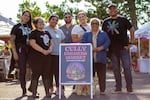
NAYA employees volunteered to help make sure the event ran smoothly. From left to right: Native Marketplace and Retail Coordinator S.A. Lawrence-Welch, Nêhiýaw and Métis (Michif); Community Development Support Specialist Ria Ward; IDA Program Coordinator SuSun Fisher, Confederated Tribes of Siletz; Native Business Accelerator Coordinator Vawn Jason Borges, Kanaka Maoli; Advocacy and Policy Organizer Cree Bort, Cheyenne River Sioux; IDA Coordinator Cecelia Lente, Pueblo of Isleta and Housing Services Manager Sam Taylor, Hopi.
Jarrette Werk / Underscore News/Report for America
“Our goal is to create a space for all marginalized folks, of course focusing in on Indigenous, Native, Black and brown vendors,” said S.A. Lawrence-Welch, Nêhiýaw and Métis, Native marketplace and retail coordinator at NAYA. “We are inviting people to be a part of that and really creating a Native-led space.”
In creating a space of accessibility and community, it was important to Lawerence-Welch to eliminate potential barriers for vendors at the market. This means all of the tents and tables are provided for the vendors and there are no fees, which are common at most other farmer’s markets.
“We’re just kind of trying to make this farmer’s market the most equitable place we can for people that may not have access to some of the other markets out there,” Lawrence-Welch said. “My goal over the next few years is to absolutely make it a destination for the community.”
For Juan Vildósola, that was what brought him out to the market — on the first Thursday in June, he was able to take the bus over with his wares, since he didn’t need to bring his own tent and table. Vildósola volunteers for his wife’s business, making and selling salsa macha. A unique flavor combination of nuts, chili and oil, they began making the salsa after moving here from Mexico and discovering that few people in Portland had tried it before.
“The help that (NAYA) is giving the vendors is incredible,” Vildósola said.
Beyond just creating accessibility for vendors, Lawrence-Welch and other event organizers strived to make the market a destination for all, regardless of socioeconomic status. One way they have done this is by providing free food boxes, filled with produce grown at the NAYA garden, to 10 community members at each market.
“Access to fresh food, artisan goods and community shouldn’t be a luxury for people,” Lawrence-Welch said.
The Cully Farmers Market will be held every Thursday from 4 to 8 p.m., June 1 to Aug. 31, at 5011 NE 42nd Avenue, hosting around a dozen vendors.
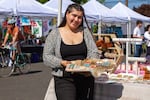
Alexis Rood, Azteca and Muscogee, began beading as a young girl when her mother took her to her first bead store. While most vendors were local, Rood traveled two hours from Lebanon, Oregon to be a vendor at the market on June 01, 2023.
Jarrette Werk / Underscore News/Report for America
Seeds of Joy
With hundreds of pairs of beaded earrings and bracelets already on display, Alexis Rood, Azteca and Muscogee, sat behind her table beading even more — blending turquoise, red, yellow, black and white together. At her booth, Seeds of Joy, Rood displayed all styles of earrings, from big hoops to long, colorful strands. The booth was adorned with faux fur and wooden boxes to complement the jewelry.
“It all started when (my mother) took me to my first bead store, just putting my hands in the big barrels of the mixed beads. We used to travel a lot so we would stop at bead stores along the road,” Rood said. “My grandfather used to tell me that with colors, it tells a story.”
On Thursday, Rood had her wares on display at one of the rotating booths at the market. Though she had to drive two hours in from Lebanon, Oregon, Rood plans to return, if not for every Cully Farmers Market of the summer, at least for a few more.
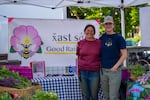
Michelle Week (left) and Domenika Radonich of x̌ast sq̓it/Good Rain Farm will be a staple at Cully Farmers Market throughout the summer. Their booth will have fresh produce with an emphasis on Native foods, as well as coffee and farm merch for purchase.
Jarrette Werk / Underscore News/Report for America
x̌ast sq̓it/Good Rain Farm
At x̌ast sq̓it/Good Rain Farm there is an emphasis on providing Indigenous first foods varieties — on Thursday the booth offered nettles, lambs quarters, garlic scapes and more. Later on in the season, staples include squash, corn, peppers and tomatoes.
“It’s a way of telling that story, and sharing that story, that we still exist, these plants still exist, these traditions still exist,” said Michelle Week, Arrow Lakes by way of Colville Confederated Tribes, owner and operator of the farms. “(Providing culturally relevant foods) is just a good way to connect everyone to all their different food stories.”
Week was awarded the 2022 Ecotrust Indigenous Leadership Award for her work at the farm. The award honors Indigenous leaders across the region, with 56 Indigenous leaders recognized since the organization began in 2001.
The farm grows food with seven generations in mind and works to increase access to culturally relevant foods. x̌ast sq̓it/Good Rain Farm will be a staple at Cully Farmers Market throughout the summer. The farm also has a CSA membership service, furthering food sovereignty efforts with options to pay a reduced fee or nothing at all, and still have access to fresh produce.
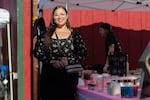
Andrea Urbina, Cherokee and Choctaw, began creating her own soaps, bath salts and candles after giving birth to her son last year. Her goal is to help others feel good about themselves.
Jarrette Werk / Underscore News/Report for America
Dreamy Drea’s
An array of colorful soaps, bath salts and candles in mason jars and teacups lined the table at Dreamy Drea’s booth. The theme of Andrea Urbina’s creations is self care.
“The real deal, main purpose, was to make me feel better,” said Urbina, Cherokee and Choctaw. “Everybody deserves to feel good and look good.”
Urbina started creating her own products after giving birth to her son in March 2022. Last winter, she heard about the Winter Marketplace event, where she first sold her products. She hopes to continue to get involved with more Indigenous marketplace events to continue to grow her business.
“I never really felt like I fit in anywhere until I got involved at NAYA,” said Urbina.
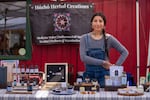
Lindsay Thomas, Diné, started Hózhó Herbal Creations when she became a birthworker, or doula. She wanted to create products using organic and ethically sourced ingredients, for pregnant and postpartum people to help themselves mentally, emotionally, spiritually and physically.
Jarrette Werk / Underscore News/Report for America
Hózhó Herbal Creations
Giving out samples of Naabaahii Blend tea and herbal salves, Lindsay Thomas, Diné, brought a spread of herbal medicine and self care products to the Cully Farmers Market, where she will be a regular vendor every Thursday.
A doula since 2020, Thomas recently began selling her own herbal products, originally geared toward supporting people who are pregnant or recently gave birth. Her products have since expanded to include something for everyone — from tattoo balm to tea to tooth powder to tinctures. Everything at Hózhó Herbal Creations is made from a blend of locally harvested herbs and herbs she brings back after visiting home on the Navajo reservation.
“My goal is really to teach the community how important it is to take care of yourself,” Thomas said. “I want to help empower the community.”
Nika is a journalist with a passion for working to provide platforms for the voices and experiences of communities often left behind in mainstream media coverage. Most recently, she worked as the health and social services reporter at The Columbian in Vancouver, Washington. Prior to working at The Columbian, Nika spent the summer of 2022, after graduating magna cum laude from the University of Oregon with a degree in journalism, working as a Snowden Intern at The News-Review in Roseburg, Oregon. A descendant of the Osage and Oneida Nations, Nika was born and raised in Portland. Her favorite way to unwind is by trying a new recipe, curling up with a good book or taking a hike in one of the many green spaces around Portland.
Editor’s note: The initial version of this story misstated the hours the market operates. This has been corrected and OPB regrets the error.

